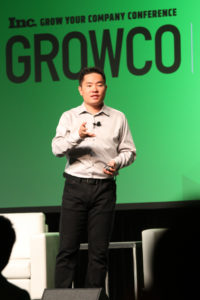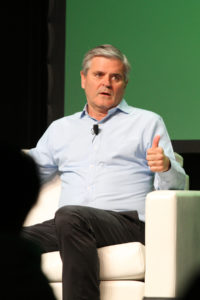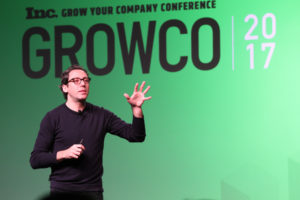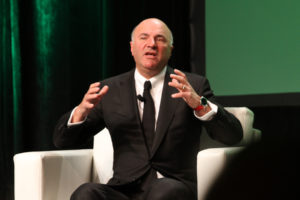That Devil on Your Shoulder
May 11, 2017
A typical entrepreneur’s origin story includes an impassioned desire to meet a challenge head-on and to build a business that solves a problem, eases a pain point or creates new opportunity for consumers. This drive becomes missional to the company – often providing the context for the formation of core values, the early recruiting of partners and certainly winning favor in the chambers of local and regional government. Brands are increasingly being lauded for their net positive impact on the wider community, inspiring loyalty that is values- and mission-driven.
Yet, there remains a nagging reality that one day, all the good intentions in the world will be called to account by the unforgiving, uncaring tribunal of sales, profit and investor returns. This formidable hydra of traditional success is still a powerful gatekeeper in capital negotiations, but as broader societal expectations change, is the role diminishing to a mere, nagging devil on one shoulder of visionary entrepreneurs?
 I had the opportunity to attend the Inc. GrowCo event this week in New Orleans. Among a crowd of several hundred entrepreneurs and executives, there was remarkable diversity in terms of gender, race and age. The two-day event featured titans of entrepreneurship: AOL’s Steve Case, Facebook’s Sheryl Sandberg, Shark Tank’s Kevin O’Leary, Warby Parker’s Neil Blumenthal and a coterie of other speakers, consultants and moderators including EO Fort Worth’s very own Jason Forrest, leading sessions to educate and inspire attendees.
I had the opportunity to attend the Inc. GrowCo event this week in New Orleans. Among a crowd of several hundred entrepreneurs and executives, there was remarkable diversity in terms of gender, race and age. The two-day event featured titans of entrepreneurship: AOL’s Steve Case, Facebook’s Sheryl Sandberg, Shark Tank’s Kevin O’Leary, Warby Parker’s Neil Blumenthal and a coterie of other speakers, consultants and moderators including EO Fort Worth’s very own Jason Forrest, leading sessions to educate and inspire attendees.
Topically, the content was truly diverse. Author and YouTube experimenter Jia Jiang shared the details of his attempt to find rejection every day. Within days of beginning his experiment in filming absurd requests of strangers, he was on a roll of getting more and more yeses. Audience members couldn’t help but feel encouraged to make bigger and bolder requests of the universe, as if the universe wants each of us to succeed.
The Angels
 Steve Case seemed to be able to mumble entire tomes of history under his breath. This is a man who rose to absolutely meteoric heights in the first wave of the internet, and has used his subsequent influence to aid in the creation and dissolution of industries, markets and even entire economies. In one breath, he can posit on the birth and death of nations, predict the next wave of digital innovation and caution sector leaders and entire governments. What shines through with Case, however, is his ongoing commitment to investing in bringing jobs and opportunity to markets that have been otherwise left out, left behind by recent growth trends. To countless blue-and white-collar professionals, Steve Case is nothing short of an angel.
Steve Case seemed to be able to mumble entire tomes of history under his breath. This is a man who rose to absolutely meteoric heights in the first wave of the internet, and has used his subsequent influence to aid in the creation and dissolution of industries, markets and even entire economies. In one breath, he can posit on the birth and death of nations, predict the next wave of digital innovation and caution sector leaders and entire governments. What shines through with Case, however, is his ongoing commitment to investing in bringing jobs and opportunity to markets that have been otherwise left out, left behind by recent growth trends. To countless blue-and white-collar professionals, Steve Case is nothing short of an angel.
 Next up was Sheryl Sandberg, Facebook’s COO and supporter of women’s entrepreneurship programs worldwide. Sheryl spoke emphatically about the deep connections that Facebook facilitates, even sharing from her own place of grief when she lost her husband and leaned on her own network of friends and family in unexpected ways. A few times, Sheryl would energetically laud the work of female entrepreneurs she had met at the conference, and would issue rallying cries to rouse the audience into magnanimous agreement.
Next up was Sheryl Sandberg, Facebook’s COO and supporter of women’s entrepreneurship programs worldwide. Sheryl spoke emphatically about the deep connections that Facebook facilitates, even sharing from her own place of grief when she lost her husband and leaned on her own network of friends and family in unexpected ways. A few times, Sheryl would energetically laud the work of female entrepreneurs she had met at the conference, and would issue rallying cries to rouse the audience into magnanimous agreement.
 Neil Blumenthal narrated his launch of the Warby Parker eyewear phenomenon, which rose meteorically in an industry that was firmly cemented in place. He spoke on the importance of the brand being tied to a mission, with even the smallest impressions leading to loyalty from customers. From its inception, the company has upheld its commitment to provide one pair of glasses to someone in need for every pair they sell. He spoke of this decision as one that included a fair amount of deliberation between him and his partners. One idea, to simply dedicate a percentage of sales/revenue to supporting communities in need was rejected because, as Blumenthal put it, someone could come along years later and decide to shave a percentage off here or there. Rather, the decision to keep it at a buy 1, give 1 model meant that the company would always be able to quantify its charitable impact to the community.
Neil Blumenthal narrated his launch of the Warby Parker eyewear phenomenon, which rose meteorically in an industry that was firmly cemented in place. He spoke on the importance of the brand being tied to a mission, with even the smallest impressions leading to loyalty from customers. From its inception, the company has upheld its commitment to provide one pair of glasses to someone in need for every pair they sell. He spoke of this decision as one that included a fair amount of deliberation between him and his partners. One idea, to simply dedicate a percentage of sales/revenue to supporting communities in need was rejected because, as Blumenthal put it, someone could come along years later and decide to shave a percentage off here or there. Rather, the decision to keep it at a buy 1, give 1 model meant that the company would always be able to quantify its charitable impact to the community.
Notably, questions from the audience probed Blumenthal for more details on his company’s giving program. In order for Warby Parker to grow as a company, provide competitive wages and benefits and cover the expense of scaling up, they had to pay attention to their bottom line. There’s that old devil. The glasses distributed to charity and not the same ones that the company sells. Distribution models are likewise prohibitively expensive in most US markets, so the company ships instead to an organization working in developing nations. Blumenthal acknowledged the risk of providing consumer goods in a market that hasn’t yet matured enough to meet its own material needs, but assured the audience that Warby Parker was dedicated to helping communities without sinking their local economies.
And on the Other Shoulder…
 The devil at this Inc. event, then, was once again embodied by Kevin O’Leary. Known ironically as “Mr. Wonderful” in his role on ABC’s Shark Tank, O’Leary continues to beat the heartless drum of profits over people. After a recent dalliance in Canadian national politics, O’Leary actually seemed to have moderated, if only a little. He is relentless in his message that the business should always come first, and his position hasn’t changed. However, whether it was a decision by Inc. to tone down the ideological conflict a little bit from previous events, or simply O’Leary’s own desire to change up his presentation, he seemed a little more…human at this event (though no more humane). And isn’t that just like the devil on our shoulder? Isn’t that devil more convincing when we see a little bit of ourselves in him? Will we listen? Do we even have a choice?
The devil at this Inc. event, then, was once again embodied by Kevin O’Leary. Known ironically as “Mr. Wonderful” in his role on ABC’s Shark Tank, O’Leary continues to beat the heartless drum of profits over people. After a recent dalliance in Canadian national politics, O’Leary actually seemed to have moderated, if only a little. He is relentless in his message that the business should always come first, and his position hasn’t changed. However, whether it was a decision by Inc. to tone down the ideological conflict a little bit from previous events, or simply O’Leary’s own desire to change up his presentation, he seemed a little more…human at this event (though no more humane). And isn’t that just like the devil on our shoulder? Isn’t that devil more convincing when we see a little bit of ourselves in him? Will we listen? Do we even have a choice?